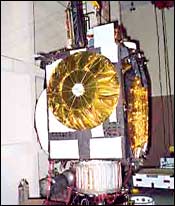Home > News > Report
Insat-3A in designated orbiting slot
Fakir Chand in Bangalore |
April 24, 2003 19:18 IST
 Insat-3A has been successfully placed in its final geo-stationary orbital slot at 93.5 deg East longitude by the Master Control Facility at Hassan in Karnataka on Thursday.
Insat-3A has been successfully placed in its final geo-stationary orbital slot at 93.5 deg East longitude by the Master Control Facility at Hassan in Karnataka on Thursday.
The largest multipurpose satellite of the Indian Space Research Organization will remain orbiting in this slot, at a distance of 36,000km from the earth, during its operational life of 12 years.
ISRO sources told rediff.com in Bangalore that the largest satellite would become fully operational by May 12, 2003.
"In the ensuing weeks, the satellite's payloads comprising 12 C-band transponders, 6 extended C-band transponders and 6 Ku-band transponders, and the two mobile satellite service transponders will be tested before the spacecraft is commissioned into service," an spokesman said.
In the last five days, station acquisition manoeuvres were conducted from MCF by firing the 10 Newton reaction control thrusters on board to position the satellite precisely at 93.5 degrees east longitude.
The spokesman also said that private television broadcasters, VSAT operators, the state-owned telecom department, and Prasar Bharati for Doordarshan have booked all the 24 transponders of Insat-3A.
"Nine of the 12 C-band transponders will cover a large area spanning West Asia to South East Asia for relaying television programs. These transponders will help TV broadcaster to target the Indian audience in these regions," the spokesman added.
It may be recalled that after the satellite was injected into the geo-stationary transfer orbit by Ariane-5 launch vehicle from Kourou in French Guayana a fortnight ago, orbit-raising manoeuvres were carried out by firing the 440 Newton liquid apogee motor on board to place it in the geo-stationary orbit.
At the end of these manoeuvres on April 14, the satellite was allowed to drift slowly towards its designated orbital slot. In this drift orbit, deployment of antennas and solar arrays was carried out on the following day.
Subsequently, the solar sail on the north side of the satellite was deployed and the spacecraft was put in three-axes stabilised mode.